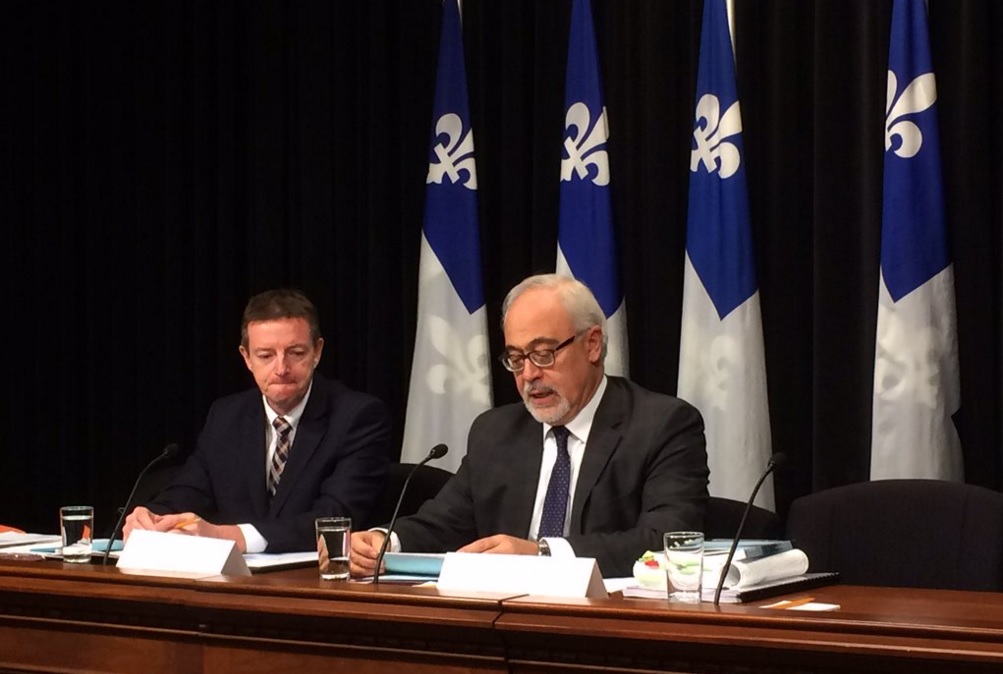Canada News
Quebec’s $2 billion surplus in 2016-17 will go toward reducing debt

FILE PHOTO: Finance Minister Carlos Leitao (in photo) said he is looking forward to the day when Quebec no longer receives equalization payments.
(Twitter photo)
Quebec has finally controlled its spending, Finance Minister Carlos Leitao said Thursday after tabling a second consecutive balanced budget with the help of $10 billion in equalization payments.
The Liberal government is actually projecting a surplus of roughly $2 billion in 2016-17, with the money going toward chipping away at the provincial debt of $207.7 billion.
Premier Philippe Couillard went on an aggressive cost-cutting campaign after being elected in April 2014. Measures included downsizing the civil service, slashing funds earmarked for education and keeping the lid on government spending.
Leitao says Quebecers are beginning to reap the benefits of that economic rigour.
“This is a budget of conviction,” he told reporters. “We were told our plan was ambitious—in a tone that was dubious of our ability to do it. Well, we did it.
“Our fiscal house is now in order. Every Quebecer contributed to the effort that needed to be made.”
The flip side to that optimism is a massive debt that will cost a staggering $10 billion to service in 2016-17.
While Quebec’s debt in terms of raw numbers is considerably lower than Ontario’s, the ratio of Quebec’s gross debt to GDP on March 31, 2015, was 55.1 per cent, compared with 46 per cent for its western neighbour.
Leitao is projecting revenue of $102.6 billion in 2016-17, including $20.2 billion in various federal transfer and equalization payments. Quebecers pay some of that money in federal income and consumer taxes.
The finance minister played down the political impact of the province receiving $10 billion from the equalization program.
“This is not Alberta and Saskatchewan transferring funds to Quebec,” he said, adding that Quebec is next to last among recipient provinces on a per-capita basis.
“This is federal revenue that comes from all Canadians in all provinces.”
Leitao said he is looking forward to the day when Quebec no longer receives equalization payments.
Quebec is also banking on Ottawa’s commitment to invest in infrastructure to help spark economic growth and has asked the federal government “to rapidly identify the projects” which will receive funding.
“Shovels must be in the ground by the next construction season, in order to revitalize the economy,” the budget document reads.
The province is calling on Ottawa to increase payments for health care to help fund services for its aging population. Quebec wants the federal government to pay for 25 per cent of provincial health-care costs, up from the 22.2 per cent set for 2016-17.
Ottawa’s health transfer to Quebec will be roughly $5.9 billion in 2016-17, which begins April 1.
Leitao says the Quebec economy will grow by 1.5 per cent in 2016 and 1.6 per cent in 2017. Growth should be helped by the low Canadian dollar and stronger U.S. economy, which the government believes should continue to boost exports.
The Education Department will receive the highest budget increase, at three per cent, up from the 0.9 per cent increase during the last fiscal year. That caused schools across the province to significantly scale back resources.
Infrastructure, programs to help increase graduation rates as well as services for students with disabilities will all benefit from the extra $1.2 billion over three years the government has set aside.
There are also modest measures to decrease Quebecers’ tax burden.
Leitao said the government will push forward by one year its plan to gradually remove a health tax that was scheduled to end in 2019.
Quebecers who make more than $18,570 pay between $100 and $1,000 a year in health taxes, which Leitao said will be eliminated by 2018 for all taxpayers.
Parti Quebecois finance critic Nicolas Marceau reminded reporters that the budget shows “a deterioration in public finances.”
He said while the budget is balanced, the government’s austerity measures over the past two years “slowed growth” to less than two per cent.
“In terms of economic growth, this budget is devastating,” Marceau said.





















